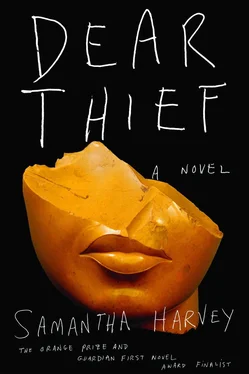I put my hand on his shoulder and said something consoling like, Don’t regret it, or You did all you could, or simply, Well. I don’t know which words slipped out and I don’t suppose they made any difference to him anyway, but when I was tidying the room after that I found I was comparing myself to him again, in the sense of being passive I mean, passive to the point of losing somebody, and I enjoyed this fantasy. I bought deeply into it for a few minutes, thinking about those few months after Spain, before you suddenly disappeared, and seeing myself as docile, tolerant, self-possessed and, at last, gentle, in the way Gene is, and Yannis too. When I pictured you and I playing 21 just after we got back from Spain I was, in my imagination anyway, tending expertly and quietly to my cards in the way Gene had tended to the remote control, while the rest of the place went to pieces.
Went to pieces? I hear you say. Who or what went to pieces? — we were a house of calm. Weren’t we happier in a way? I hear you ask it almost sweetly. After all, you might have slept with Nicolas, but you were never going to expect him to leave his family or give himself in any way to you; devotion was not a quality you asked of people, commitment neither; you did not give these things and did not ask for them. If you could give and receive moments of happiness and self-escape, that was enough, that was, in fact, everything. Didn’t Nicolas become a different man after that, one who went from investing endless hope in a world that rarely delivered to one who had had a hope met? After a month or so of bitter exclusion he found himself gradually allowed back into the fold and he did not come back in regret and self-loathing, but with a certain muted victory over life and over the forces of loss. He had done what he liked and got away with it; his incredulity was plain to see, his new faith in the ability to be happy, to have what one wants. To have all the things one wants, at once, without conflict or reproach or guilt, to be allowed such a thing.
Didn’t we live in a kind of new communal harmony? Didn’t our household take on a new unity and balance? Everybody was someone and had a role to play. By that point you had been with us for two years as an outsider and then all at once you were part of our number. You developed a perverse obsession with cooking, mainly single-pan maverick meals of meat and foraged greens. You were going through a phase of eating liver and kidneys that the butcher gave you for next to nothing, so you dealt up fortified pans of iron and blood, and the zincy phosphorus of greens, thick glossy chard cooked down to a mulch, limp chickweed and sweet nettles that were, pre-massacre, probably emerald and springy; a plateful of soft metals that Teddy would not have eaten if anybody but you had put it in front of him.
I remember one meal in particular, one I’m sure you will not remember at all (or which did not even sink in far enough to become a memory), when you put one of these plates of chickweed and liver in front of us, and Nicolas, staring at it expressionless for a few moments, said, ‘I am not going to eat this.’ There was no anger in that or even impatience or frustration, he just put it to you as a fact, and you smiled from somewhere remote and said thickly, ‘You don’t like the look of it?’ ‘Starvation would be preferable.’ You patted his knuckle lightly with your knife: ‘Starve then.’
Once, you see, before Spain, he would have been too polite to refuse your food because you were a house guest and his wife’s friend; even after two years of you living with us he managed to maintain that courtesy. Now you and he had a relationship of your own, whatever that was, and that meant he could be critical of you in the way people can when they know a cord is not so fragile as to snap under a little pressure. You, who would once have hated to offend him, your friend’s husband, treated him with the confidence of somebody who has earnt the right to offend a thousand times.
And as for me, I sat without a word, docile and unruffled; I did not get up to make Nicolas something else, as I probably would have before, instead he got up and made us all something else, a quick thing like a fry-up, I expect. After dinner he went to put Teddy to bed and you washed up while I dried; it took you over half an hour. You were slow and heavy-lidded and moved your arms like a swimmer, and broke a plate by smashing it against the tap in a misjudged movement. Afterwards when you had sunk down into the sofa in a drowsy ebb and flow of consciousness and I went for a bath and Nicolas spread his paperwork on the bed and Teddy slept, I remember feeling almost content, a feeling I relate to being a child when my family was all together, one of knowing everything is in its place.
Everybody has a sudden power. Nicolas can say, I am not going to eat this. You can say, Starve then. I can refuse to get up and help. Nobody bears any responsibility to please, everybody is tongue-and-groove with everybody else. Nicolas takes on a new intensity in bed, which is to say, You are my wife . It is not gratitude that makes him passionate but a zealous kind of — what can I say? — revelry, revelry in the unbreakable bond, so that somehow the two of us have become closer, our marriage more magnificent, I think, in his eyes. You and I too, closer — in a de facto way more than a practical one, but all the same closer; because we are always closer when one has taken too much from the other. Always closer when ousting and threatening, because a meaningful relationship thrives on reasserting yourself against the other; that is what it is to relate rather than to be alone — which makes me realise now, as I write, how I never for a moment felt alone in that period between Spain and you leaving.
Neither could you have; you were busy turning your attention to the most intimate, faithful relationship of your life, one you practised in the privacy of your room. You affixed a lock to the inside of the door so that Teddy couldn’t amble in, and when you came out sometime in the early evening your face and neck were flushed and you would move languidly about the house in uninterruptible peace, and at times go about a period of prolonged, ecstatic cleaning, and then curl up in the armchair and sleep. Once a fortnight, you told me. One needed a strict limit with a drug like heroin, and one had to know where the tipping point was. For you it was once a fortnight, this and no more. If you could keep it this way you could manage the addiction and it was better, when you had it, it was all the better for the wait.
I suppose there is no more loyal and private a relationship than that between a user and her drug, it leaves no room for anybody else. Either you were locked with it in your own world or you were weathering out the time until you could have it again. At first this seemed workable, and certainly on that October morning in the mist, when you spoke about the gauze of life and you and Nicolas danced through your conversation about the deities of the morning, jubilant and quick-witted, certainly then you seemed lifted. But by Christmas of that year you would spend your fortnight in such anguish; you might not know how agitated you became then, irritable and barbed even towards Teddy, and restless, messy, withdrawn, more and more unkempt, a nightmare, a slow-occuring natural disaster. We went to the coast of Mid Wales one afternoon in early December and while we walked the coastal path you sat on a short promontory watching a wave smashing at a rock; I tell you this because I doubt very much you remember. We had to go back for you at the end of the walk and pull you to your feet. Your fists were clenched. This was what day thirteen began to look like, and then day twelve looked like it, and eleven.
And so I have told you, and I will tell you again, that I am not good, or lenient, or gentle. What kind of a friend will watch this happen and nod, and allow the idea that heroin only once every two weeks constitutes some sort of healthy, moderate regime? I was no kind of a friend to you, a thing we both know. It was not Gene’s docile passivity that made me accept our triangle. You had looked, shaken your head at me, shaken your head! No, you had said, do not intervene, and I had stood there in the humid Spanish night as if drugged, convinced that what was happening was somehow an inevitability of your fate, to which we were all silent witnesses and secondary players. But then you were always so convincing, and your fate was always the most pressing.
Читать дальше












